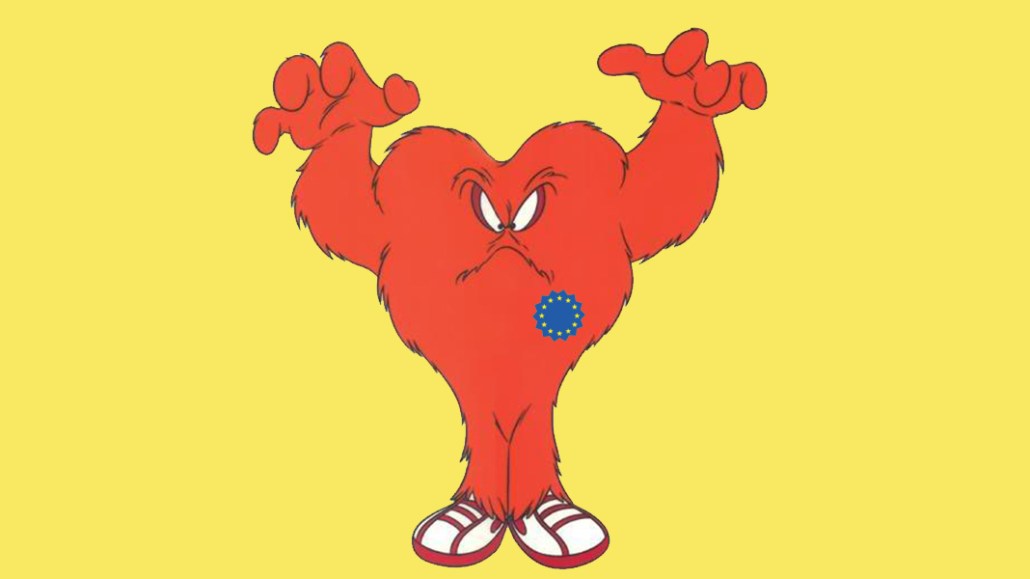Secure your place at the Digiday Publishing Summit in Vail, March 23-25

Government authorities have faced mounting pressure to regulate technology platforms across the world. This week, an independent watchdog recommended U.K. Prime Minister Theresa May introduce two new laws that would see platforms like Google and Facebook face similar regulations to publishers. Add to that the ongoing antitrust cases in Europe and accusations of spreading Russian propaganda, and platforms have been faced with more government intervention than they could have anticipated.
Here’s what you need to know about how governments are trying to control the ways platforms conduct business in Europe.
Key dates and figures:
- Jan. 1, 2018: Germany’s regulation comes into full force, requiring social platforms to take down criminal content within 24 hours
- €50 million ($59 million) fines can be applied under the law if social media platforms fail to comply
- €2.4 billion ($2.8 billion) fine imposed by the European Union against Google in June for illegally promoting its own price comparison service in searches
- Two more ongoing investigations into Google’s alleged abuse of its market dominance in Europe within search ads and Android services
Fake news is a Trojan horse
For publishers, concern has been brewing for years about the duopoly’s tightening fist around the digital ad market. Commercially, especially in the anti-regulatory U.S., publishers have been hamstrung until fake news took hold in the last 18 months. Suggesting that platforms enable the spread of fake, misleading or hateful information has given lawmakers and the media industry something tangible to rally behind.
The economics of the marketplace are broken
Whether publishers would benefit from tighter controls on platforms around hate speech is unlikely, and blanket regulation is a blunt tool that feels uncomfortably close to hindering freedom of speech, which no one wants. Even so, publishers are in a zero-sum tussle with Facebook and Google; it’s no secret they need a bit of assistance.
“The U.K. government is now cognizant of the plight of news content creators; the government knows that content will soon cease to get produced because the economics of the marketplace is broken,” said Scott Gill, group commercial director at Mediaforce Group, adding that publishers are engaging with the government to look at what dynamics could be introduced to level the playing field so that publishers can claw back some revenue share, and “the government is eager to listen.”
Publishers have long grumbled that Facebook Instant Articles gives scant data on readers. Publishers can monetize the format, but they are left with few targeting capabilities, while Facebook can more effectively target users within its own platform. This is one of the many headaches that governments would have to consider.
The platform view
The platforms didn’t set out to be publishers. Even so, the balance needs to be readdressed. This week, Facebook agreed to pay its taxes, and Google has been investing more in its Google Digital News Initiative, granting news publishers funding for projects.
Regulation alternatives
Matthew Hancock, U.K. minister for the department for digital, culture, media and sport, wants to prioritize how the government can help publishers continue to compete economically with the duopoly. This could take many forms. One option is levying taxes on Google and Facebook, which would then subsidize publishers, similar to how the gambling industry subsidizes horse racing. This could have negative outcomes, like deciding what classifies as valuable content and whether digital publishers that license and distribute user-generated content would be allowed in this pool.
Another option is a watermarking system within the digital ad ecosystem implemented by Google, so when Google passes on a bid request, the buyer can see from a watermark that it’s buying premium inventory and can decide whether to pay more for it. Again, this poses questions about who decides what content or publisher qualifies, but it’s a starting point. “It would align investment in content with investment in advertising,” said Gill. “Why should publishers get the same yield per thousand impressions on an article containing investigative journalism as the National Rail does on a page where someone looks up the rail times? There’s not a vast enough quantum of difference to incentivize investigative journalism.”
Ultimately, bureaucracy is a slow-moving beast. When the headlines and words will turn into action is anyone’s guess.
More in Media

WTF is a creator capital market?
What is a creator capital market, what does it mean for creators looking to diversify revenue, and why is it so closely tied to crypto?

Media Briefing: Publishers explore selling AI visibility know-how to brands
Publishers are seeing an opportunity to sell their AI citation playbooks as a product to brand clients, to monetize their GEO insights.

Creators eye Snapchat as a reliable income alternative to TikTok and YouTube
Figuring out the Snapchat formula has been very lucrative for creators looking for more consistent revenue on a less-saturated platform.





